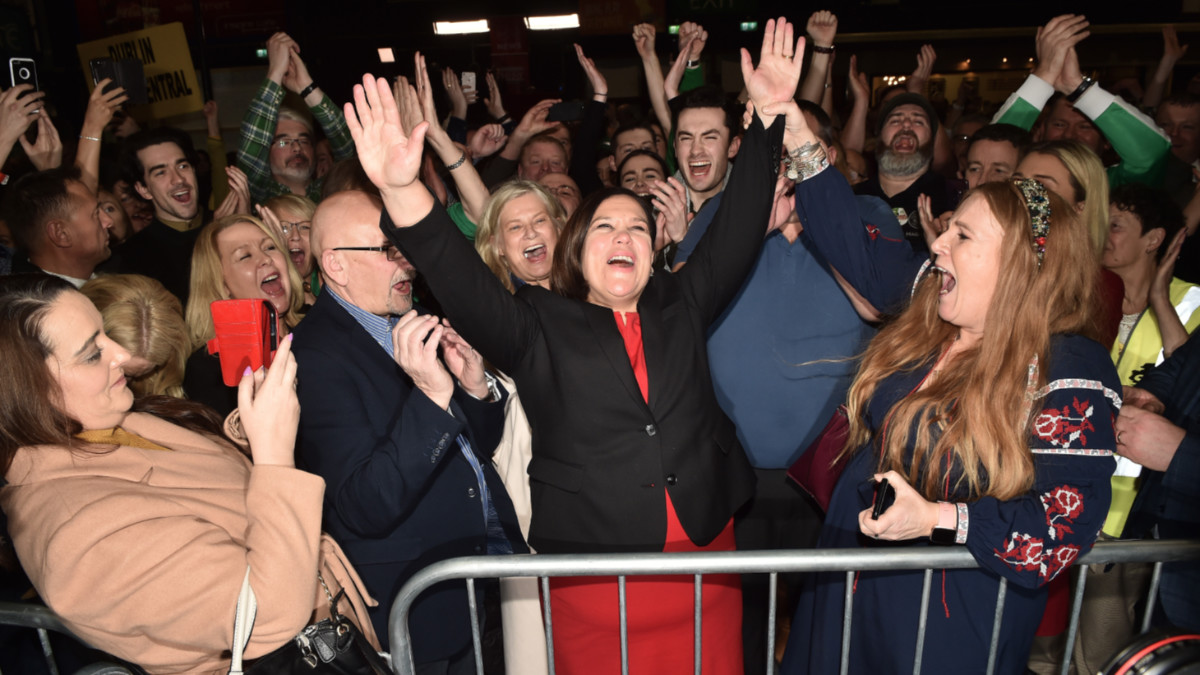Could Ireland-domiciled small caps (and big businesses) feel aftershocks of the political earthquake?

Sinn Fein leader Mary Lou McDonald celebrating with her supporters on Election Night (Picture: Getty)
Australian people and businesses may not be interested in the state of Ireland’s politics, but there are three ASX-listed stocks that call Ireland home and are probably watching the situation closely.
Last weekend, left wing nationalist party Sinn Fein rocketed to 24.5 per cent of the vote, sending the election into a three-way tie with the two major parties Fianna Fail and Fine Gail.
Sinn Fein leader Mary Lou McDonald declared that “there is no longer a two-party system”.
It is anyone’s guess what will happen next. On one hand there has been speculation the two parties could form a coalition to keep Sinn Fein out.
On the other, both could be kept out if Sinn Fein forms a coalition with minor parties — something McDonald has already said she is trying to do.
The ASX’s Irish trio
One of the three Ireland-domiciled small caps is medtech Oneview Healthcare (ASX:ONE), which has a software platform designed to improve workflows, care coordination and decisionmaking.
This week its share price is unchanged, but it has more than halved since last September. Stockhead contacted the company but it declined to comment.
Second of the Irish trio is insurance software stock Fineos (ASX:FCL), which only listed on the ASX last August.
This week it has retreated 2 per cent, but still sits 38 per cent ahead of its $2.50 IPO price.
The third is a controversial company — large-cap James Hardie (ASX:JHX). Despite being founded in Australia in 1888 (albeit by British expats) it has been headquartered overseas since 2001, first the Netherlands and then moving to Ireland in 2010.
Both moves prompted allegations it was an attempt to minimise taxes and escape obligations to compensate asbestos victims.
A tax haven no more?
And several other multinational firms have either moved their headquarters outright to Ireland or are establishing subsidiaries to funnel profits through to avoid tax because of a high 12.5 per cent corporate tax rate.
The most notable example is Apple which does this with its European sales.
In 2018, the top 10 corporation residents in Ireland (which included Facebook and Google) paid 45 per cent of all corporate tax. Only 20 per cent was from domestic firms.
Various proposals in Sinn Fein’s manifestos, particularly the one about raising taxes by €3.8bn, have spooked businesses in Ireland.
While Sinn Fein did not promise to change the headline corporate tax rate its proposals included:
- A 15.75 per cent employee social insurance contribution for employers earning over €100,000,
- Phasing out tax credits for high skilled workers earning €100,000-140,000 and;
- Taxing intellectual property assets ‘onshored’ in Ireland.
During the campaign, business group IBEC warned Ireland would become less attractive to businesses. However, this week it came out and declared Sinn Fein was “not mad” when it came to the economy.
There are also concerns it may try to seek Irish unification, which would mean more uncertainty for business.
Dublin won’t be the next London
Economist Tim Harcourt told Stockhead any impact on the Australian or global markets would likely be less significant than other economies.
He argued the only certainty was that Ireland would not replace London as Europe’s financial hub post-Brexit.
“While I’ve got admiration for the rise of the Celtic Tiger, I didn’t think it was a competitor to London — continental Europe more so,” he said.
“This change with Sinn Fein making ground will make that even more the case.
“Ireland went through with economic reform with low taxes and investment incentives. It delivered for a while but since the GFC, austerity [measures] and banking issues, you’ve seen a move towards social democratic positions.”
Harcourt said Ireland’s most recent PM focused heavily on Brexit but “took his eye off the ball back home” and paid the price.
He also noted many Australians might have a soft spot for Ireland as many were of Irish descent. But Australia’s business interests in Ireland were small compared to its next door neighbour.
UNLOCK INSIGHTS
Discover the untold stories of emerging ASX stocks.
Daily news and expert analysis, it's free to subscribe.
By proceeding, you confirm you understand that we handle personal information in accordance with our Privacy Policy.








